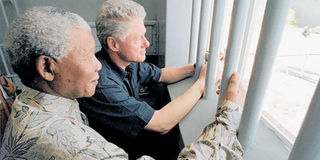Mandela and the failed vision of a united Africa - 4

What you need to know:
- Nelson Mandela in the ‘Speech from the Dock’ defending himself in a treason trial said: “…I have fought against white domination, and I have fought against black domination. I have cherished the ideal of a democratic and free society in which all persons live together in harmony and with equal opportunities. It is an ideal which I hope to live for and to achieve. But if needs be, it is an ideal for which I am prepared to die…”
In this part of a series on Nelson Mandela’s story, we see his metamorphosis from pugilist to prisoner, and then president. As the President of South Africa, we will look at his miracle of reconciliation – a man once considered a terrorist saved his country from a civil war and dismantled the system of apartheid through the spirit of reconciliation.
His strong reunion desire with his tormenters made him an authority of truth and became an icon of freedom and peace.
Nelson Mandela in the ‘Speech from the Dock’ defending himself in a treason trial said: “…I have fought against white domination, and I have fought against black domination. I have cherished the ideal of a democratic and free society in which all persons live together in harmony and with equal opportunities. It is an ideal which I hope to live for and to achieve. But if needs be, it is an ideal for which I am prepared to die…”
On the 11th of June 1964, Mandela and his colleagues were finally accused, convicted and sentenced to life imprisonment. The prisoners included Walter Sisulu, Ahmed Kathrada, Govan Mbeki, Raymond Mhlaba, Denis Goldberg, Elias Motsoaledi and Andrew Mlangeni. They were all sent to Robben Island Prison, except Denis Goldberg who was sent to Pretoria Prison because he was white.
Mandela then spend twenty-seven years in jail working in a lime quarry, breaking rocks into gravel. He endured quiet suffering as the apartheid government tried to isolate him from the public. But as years passed, he came to be regarded as a martyr; one who suffers for the freedom cause in South Africa and around the world. Mandela’s stay in prison now stirred domestic and international pressure to release him.
With fears of a racial civil strife, President F. W. de Klerk released Mandela in 1990. And in a negotiation between the ANC and the government, apartheid was abolished and the first multi-racial general election was held in South Africa between the 26th and 29th of April 1994. Mandela led the ANC to victory and became the first black President in a free South Africa on the 10th of May 1994.
Mandela formed and led a broad coalition -- a Government of National Unity in which de Klerk former apartheid leader was deputy president. Together they initiated a reconciliation process to unite different racial groups in the country and attain lasting peace.
Michael Henry Wilson, writing on the Mandela miracle of reconciliation, said: “…His outsider’s perspective finds in Mandela an exemplary hero who broke down an inhumane ideology after having been its most notorious victim: ‘a Biblical figure’ whose wisdom will be a source of inspiration for future generations. …The world needs people like him…”
The South African Constitution was then drafted and it enshrined in its cores the spirit of reconciliation and forgiveness as shown in its preamble: “…We, the people of South Africa, recognise the injustices of our past; honour those who suffered for justice and freedom in our land; respect those who have worked to build and develop our country and believe that South Africa belongs to all who live in it, united in our diversity. …We therefore, through our freely elected representatives, adopt this Constitution as the supreme law of the Republic so as to: Heal the divisions of the past and establish a society based on democratic values, social justice and fundamental human rights…”
The Constitution further offers healing to a people torn apart through racial divide by asserting: “…We therefore, through our freely elected representatives, adopt this Constitution as the supreme law of the Republic so as to: Heal the divisions of the past and establish a society based on democratic values, social justice and fundamental human rights; lay the foundations for a democratic and open society in which government is based on the will of the people and every citizen is equally protected by law; …and build a united and democratic South Africa able to take its rightful place as a sovereign state in the family of nations…”




